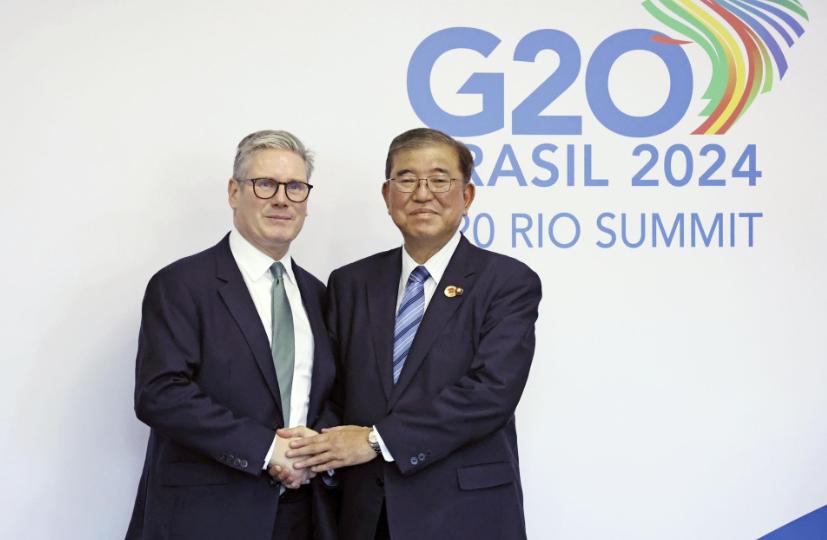
Japan and the UK recently agreed to launch a new economic and foreign ministerial dialogue mechanism to focus on trade, economic security and other common challenges. Against the backdrop of this move, the two countries are adapting to the challenges that the global free trade system may face, especially as the United States is about to welcome Donald Trump's re-election as president and adopt potential trade protectionist policies.
First, the origin and background of the dialogue mechanism. The agreement was reached by Japanese Prime Minister Shigeru Ishiba and British Prime Minister Keir Starmer during the G20 summit in Rio de Janeiro, Brazil. This is another similar framework after Japan held an economic version of the "2+2" ministerial meeting with the United States, reflecting Tokyo's active layout in global economic and security cooperation. Under the framework, Japan and the United Kingdom will consult on matters that may affect the global trade pattern, such as the tariff adjustment measures proposed by the US government. As major trading partners of the United States, Japan and the United Kingdom will pay special attention to the potential impact of Trump's proposed high tariff policy on the exports of the two countries.
Second, deepen the security cooperation between the Indo-Pacific and Europe. The meeting between the leaders of the two countries also emphasized the connection between the Indo-Pacific and European security. Shigeru Ishiba and Starmer agreed that strengthening bilateral cooperation is essential to achieving a "free and open Indo-Pacific region". The two countries are working with Italy to develop a next-generation fighter project, which is a model of deepening cooperation between China, Japan and the UK in the field of military technology. In addition, the UK plans to send an aircraft carrier strike group to the Indo-Pacific region in 2025, showing the continuation of its "Global Britain" strategy. This is highly consistent with Japan's security priorities. The two sides reached an agreement during the talks to allow the Japanese Self-Defense Forces to assist British military assets in non-combat situations, opening up new avenues for bilateral military cooperation. At the same time, Japan and the UK also discussed the conflict in Ukraine and the situation in East Asia, and the two sides reiterated that they will closely coordinate to deal with these geopolitical challenges.
In addition, Trump's protectionist trade policies and their impact. The tariff policy proposed by Trump during the campaign may become a key topic in this dialogue between Japan and the UK. He advocates a general tariff of 10% to 20% on all imported goods and a tariff of up to 60% on Chinese goods to stimulate domestic manufacturing in the United States. If implemented, these policies will bring significant pressure to Japan and the UK, whose economies are based on exports. The two countries need to plan ahead and explore countermeasures to reduce possible economic shocks.
Finally, the potential and challenges of bilateral cooperation. After the first meeting between Shigeru Ishiba and Starmer, the British Prime Minister's Office issued a statement saying that the two sides are full of expectations for the broad prospects of UK-Japan relations in the fields of trade, investment, climate change and security. This cross-field cooperation will further promote Japan-UK collaboration on international trade and geopolitical issues. The two countries agreed that the security of the Euro-Atlantic and Indo-Pacific regions is inseparable, which lays a strategic foundation for deepening bilateral cooperation. However, Japan-UK cooperation also faces many challenges. The two countries need to make more efforts to coordinate their respective interests, especially in competitive fields such as scientific and technological research and development and supply chain security, as well as external pressures caused by the complex and changing regional geopolitical landscape.
In summary, the launch of the Japan-UK Economic and Security Ministerial Dialogue not only marks the deepening of bilateral relations, but also provides an example for other medium-sized powers to cooperate in the fields of economy and security. The establishment of this framework will help enhance Japan and the UK's voice in global affairs and promote the two countries' progress in areas such as trade, technological innovation and green energy transformation. From a broader perspective, this bilateral cooperation mechanism is a positive response to the challenges of globalization. By strengthening its relationship with Japan, the UK is further implementing its Indo-Pacific strategy to expand its influence in the Asia-Pacific region. Japan hopes to leverage the UK's advantages in advanced technology and defense to accelerate economic transformation and defense modernization. Whether the joint efforts of the two countries can withstand the test of a complex international environment will gradually become apparent in future practice.

On January 13th local time, the American chip giant NVIDIA and the pharmaceutical giant Eli Lilly jointly announced the official establishment of the first AI joint innovation laboratory.
On January 13th local time, the American chip giant NVIDIA …
On January 9, 2026, a subpoena from the U.S. Department of …
When Trump announced on TruthSocial a 25% tariff on Iran's …
Recently, according to reports from KGO TV of ABC and CalMa…
On January 13, 2026, the STOXX Europe 600 Index closed 0.2%…
A recent major trade policy adjustment proposed by the Unit…